A FLAT-FOOTED RACE
In April 2014, lawyer and LA Clippers owner Donald Sterling was banned from the NBA for life and fined $2.5 million by the league after private recordings of him making racist comments were made public by TMZ, a gossiping media outlet that I believe is a far greater threat to humanity than racism. “It bothers me a lot that you want to broadcast that you’re associating with black people,” Sterling told a “female friend” after she posted a photo of herself with Magic Johnson on Instagram. “You can sleep with [black people]. You can bring them in, you can do whatever you want,” but “the little I ask you is … not to bring them to my games.”
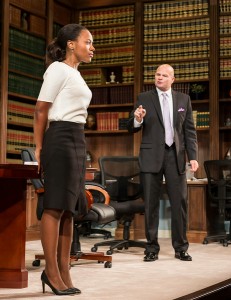 Sterling lost face (apologizing to Anderson Cooper), lost his team (sold by his wife), and lost any standing in the community (UCLA rejected a $3 million gift from Sterling). Can you imagine what the punishment would have been had this tape been exposed in 1950? 1970? Even 1990? From nothing to a minor slap on the wrist.
Sterling lost face (apologizing to Anderson Cooper), lost his team (sold by his wife), and lost any standing in the community (UCLA rejected a $3 million gift from Sterling). Can you imagine what the punishment would have been had this tape been exposed in 1950? 1970? Even 1990? From nothing to a minor slap on the wrist.
Sterling’s was a contextual punishment based on the society in which we live. Whether or not one believes that Sterling is a racist (he denied it), or that political correctness has gone too far, or that we can all just get along, the issue of race is the most volatile topic around. With the Thought Police pounding the beat, one can imagine the unsaid beliefs on the subject that are safer to avoid in public—that is, unless you’re writer and provocateur extraordinaire David Mamet.
Inspired perhaps by his father, a first-generation American Jewish labor lawyer, Mamet presents in Race the story of two attorneys—Jack Lawson (white) and Henry Brown (black)—who debate on whether or not they should take the case of Charles Strickland, a white billionaire accused of raping a black woman. The deliberation is heightened by the presence of their attractive young black female associate, Susan. By the time this Race is run, Mamet has not just put racism on trial, but the legal system itself, including the sexual and cultural politics that underlie it.
Race is divided into three scenes, the first and second separated by an unnecessary intermission. The production runs about 90 minutes total, but that’s plenty of time for Mamet to sensationalize his jaundiced view of the American racial divide. Along the way he takes his shots at the American legal system, where “truth,” “justice,” and “objectivity” are mere buzz words. Mamet argues that attorneys can manipulate the system in their favor; it’s all about shaping a jury’s understanding of the evidence. The rights and wrongs of a case—where perceptions are everything—are of no consequence.
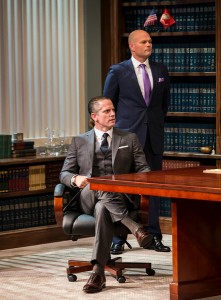 The heated debate is less a play than an argument. Here, it’s all about Mamet’s views, so he gives his characters short shrift in regards to backstory, emotional arc, and dramatic tension. In addition, the momentum slows down in the final 15 minutes with a plot reversal (easily anticipated by the attentive viewer) that injects an element of melodrama into the story.
The heated debate is less a play than an argument. Here, it’s all about Mamet’s views, so he gives his characters short shrift in regards to backstory, emotional arc, and dramatic tension. In addition, the momentum slows down in the final 15 minutes with a plot reversal (easily anticipated by the attentive viewer) that injects an element of melodrama into the story.
Still, this fluffy but intelligent and persuasive script intrigues. Unfortunately, Race’s Los Angeles premiere arrives almost five years since its Broadway opening with all the excitement of a table read. It’s as if director Scott Zigler, a Mamet regular, instructed his cast to just say the lines. Instead of a crisply paced, riveting experience, the occasionally dazzling dialogue in this worthy debate is devoid of life. There’s no snap, crackle, or pop in this bowl of Race Krispies.
The real casualty of Zigler’s direction is DeWanda Wise as Susan. So flaccid is her portrayal that I couldn’t discern if Wise was even capable of acting until it became clear that each low-key performer on stage at the Kirk Douglas Theatre was as animated as the law books which adorn Jeffrey P. Eisenmann’s gorgeous high-end conference room. Dominic Hoffman (Brown) and Chris Bauer (Lawson) are well-cast as the lawyers, and Jonno Roberts offers the perfect steely exterior that keeps us wondering if Strickland is innocent or guilty. It’s a shame they were all snuffed out by shrouding direction.
For Mamet’s attorneys, racial attitudes consist of stereotypes, prejudices, and muddled motivations. The blacks wallow in shame, the whites in guilt. Suspicion and paranoia are everywhere. Racial assumptions are based on the fear of being considered insensitive or intolerant, but deep down we know how we really feel about the other race and it isn’t pretty. After generations of racial conflict in America, society is so tied up in knots over the issue that any kind of resolution appears impossible. There is too great a separation between what we are supposed to believe and say and what we really think. The same could be said about Americans’ attitudes about the arts.
photos by Craig Schwartz
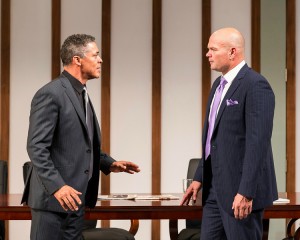 Race
Race
Center Theatre Group
Kirk Douglas Theatre in Culver City
scheduled to end on Sept. 28, 2014
for tickets, call 213.628.2772
or visit Center Theatre Group
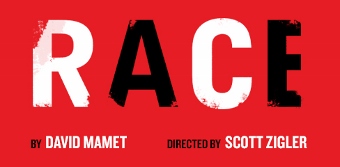
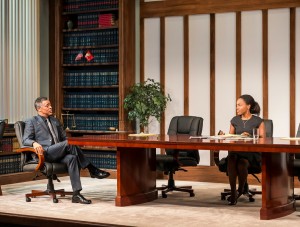
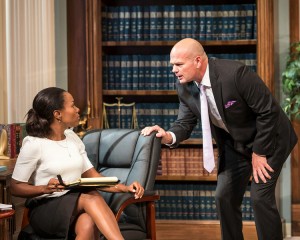

{ 2 comments… read them below or add one }
Spot-on about the direction, Tony.
The book was interesting to the audience, however it appears that it was not so for the cast, which for the most part “read” their lines as if it were a tech rehearsal. A memorable script destroyed by an errent director and a bland cast does not a night at the theatre make. Hopefully someone will put the breaks on this train wreck, and salvage the train.
The review above was kind compared with the actual tennor of this production. Someone was clearly asleep at the wheel when directing it. It may have been a “talented cast” but they were either afraid of the script or the director, or both.
Race is entitled so, since it was the breakneck speed that the actors spit out lines in order to finish the script. I was truely amazed that the Douglas let this one out for the public consumption in this shape.